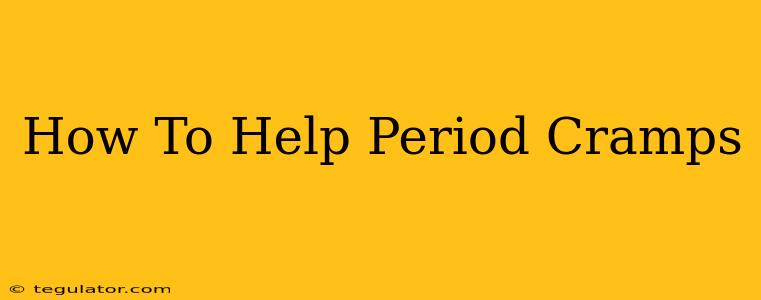Menstrual cramps, or dysmenorrhea, are a common experience for many women, causing significant discomfort and impacting daily life. Understanding the causes and exploring various relief methods is crucial for managing this monthly challenge. This comprehensive guide will explore effective strategies to help alleviate period cramps, offering natural remedies and medical approaches.
Understanding Period Cramps: Causes and Symptoms
Before diving into solutions, it's essential to understand the root causes of period cramps. The primary culprit is prostaglandins, hormone-like substances released during menstruation. These chemicals cause the uterus to contract, leading to pain. Other factors contributing to cramping intensity include:
- Hormonal imbalances: Fluctuations in estrogen and progesterone levels can influence cramp severity.
- Endometriosis: This condition involves the uterine lining growing outside the uterus, causing intense pain.
- Fibroids: Noncancerous growths in the uterus can also contribute to cramping.
- Pelvic inflammatory disease (PID): An infection of the female reproductive organs can lead to severe pain.
Common symptoms of period cramps include:
- Sharp, cramping pain in the lower abdomen: This is the hallmark symptom.
- Lower back pain: Pain often radiates to the lower back.
- Headaches: Many women experience headaches alongside cramps.
- Nausea and vomiting: In severe cases, nausea and vomiting can occur.
- Diarrhea: Some women experience digestive upset.
- Fatigue: Feeling tired and lethargic is common.
Natural Remedies for Period Cramp Relief
Several natural methods can effectively alleviate period cramp pain:
1. Heat Therapy: Soothe Away the Ache
Applying heat to your abdomen and lower back can relax uterine muscles and reduce pain. Consider using:
- Heating pad: A reliable and convenient option for consistent warmth.
- Warm bath or shower: The soothing warmth of water can provide significant relief.
- Warm water bottle: A portable and readily available solution.
2. Gentle Exercise: Boost Circulation and Reduce Pain
While it might seem counterintuitive, light exercise, such as yoga, walking, or stretching, can improve blood flow and reduce cramping. Avoid strenuous activities that might exacerbate the pain.
3. Over-the-Counter Pain Relief: Quick and Effective Solutions
Nonsteroidal anti-inflammatory drugs (NSAIDs), such as ibuprofen (Advil, Motrin) or naproxen (Aleve), are effective at reducing pain and inflammation. Follow the recommended dosage on the packaging.
4. Dietary Changes: Nourish Your Body for Relief
Certain dietary adjustments can make a difference:
- Reduce caffeine and alcohol intake: These can worsen cramping.
- Increase your intake of magnesium-rich foods: Magnesium helps relax muscles. Good sources include spinach, almonds, and dark chocolate.
- Stay hydrated: Drinking plenty of water helps overall health and can aid in pain management.
5. Herbal Remedies: Exploring Natural Options
Some herbal remedies, such as chamomile tea and ginger, possess anti-inflammatory properties that may provide relief. Consult with a healthcare professional before using herbal remedies, especially if you are taking other medications.
Medical Interventions for Severe Cramps
If natural remedies fail to provide adequate relief, or if your cramps are severe and debilitating, consult a doctor. They may recommend:
- Prescription pain medication: Stronger pain relievers may be necessary for severe cases.
- Hormonal birth control: Birth control pills, patches, or IUDs can regulate hormones and reduce cramping.
- Other medical treatments: Depending on the underlying cause of your cramps (e.g., endometriosis, fibroids), further medical intervention may be required.
When to See a Doctor
While period cramps are common, it's crucial to seek medical attention if you experience:
- Intense pain that interferes with daily activities.
- Cramps that suddenly worsen.
- Fever or chills.
- Heavy bleeding.
- Painful intercourse.
Conclusion:
Managing period cramps effectively involves understanding their causes and exploring various relief methods. This guide provides a range of options, from natural remedies to medical interventions. Remember to listen to your body, prioritize self-care, and consult a healthcare professional if you experience severe or persistent pain. By adopting a holistic approach, you can effectively manage your period cramps and improve your overall well-being.

